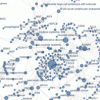Posts tagged diagnosis

Cancer Genomics: so many mutations!
Feb 18th
The human genome is the complete collection of over three billion bases in each of our cells. Cancers accumulate multiple changes, or mutations, in their DNA that contribute to the disease by changing how cells behave. For instance, cancers need nutrients to grow. Very often, they get these nutrients by producing signals that encourage new blood vessel formation. Finding the mutations that lead to cancer is very difficult. For one thing, even for cancers that affect the same tissue and look similar, the mutations can be very different. Also, one of the hallmarks of cancer is an increased rate of More >

New approach to Alzheimer’s diagnosis
Jul 13th
Alzheimer’s disease is a debilitating, ultimately fatal neurological disorder which affects more than 5 million Americans. The disease has no cure, but the recent decade has seen many promising treatments which all depend upon diagnosing Alzheimer’s as early as possible.
Typically, Alzheimer’s is diagnosed through cognitive testing. Family members or health care professionals may realize that a person is experiencing forgetfulness, disorientation, or other symptoms. Unfortunately, by the time these symptoms are apparent and a diagnosis is made, the patient may have already experience a great deal of brain damage.
A new method to test for Alzheimer’s at a much earlier stage More >

Childhood Indications of Schizophrenia
Jan 25th
A recent 30 Year longitudinal study of individuals from New Zealand has revealed early indications of schizophrenia development later in life. Unlike many mental disorders, schizophrenia usually strikes much later in life (usually in mid to late adolescence) and so parents and patients alike may be unaware that there is a potential problem. In many places adequate access to proper mental-healthcare is lacking, so even when a diagnosis is possible, treatment may not be.
Obviously, the earlier individuals have access to information about their health, the longer they have to make appropriate choices. When it comes to mental-health, a properly responsive More >
